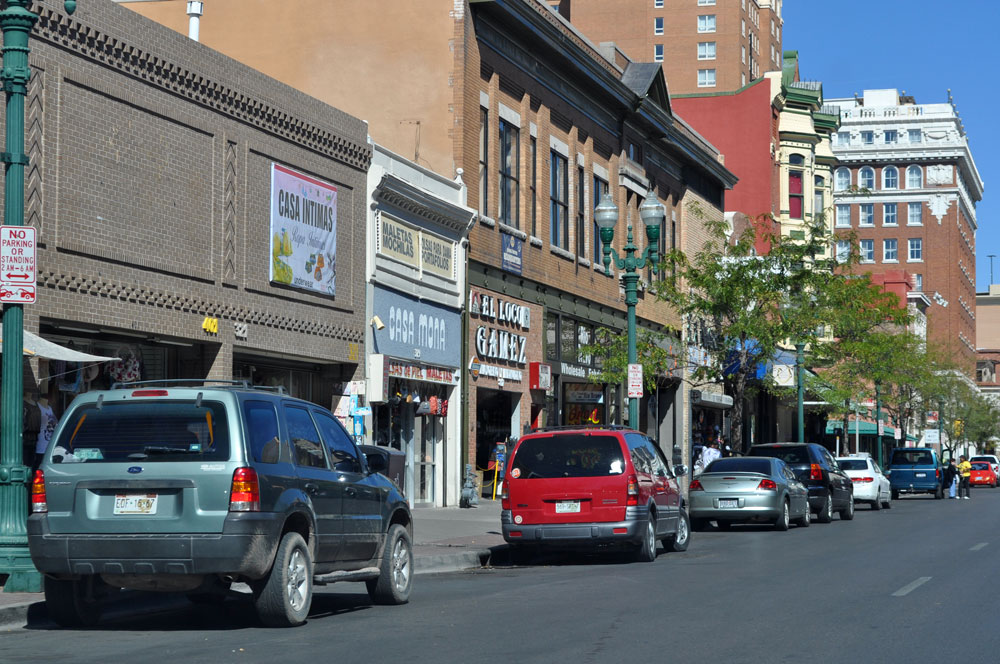
Signs in Spanish, a common view in El Paso. (Jose Luis Trejo/Borderzine.com)
EL PASO – Blue-eyed, brunette, and light-complexioned Michael Alden has called El Paso his home for nearly all his life.
Alden, 24, was born and raised in El Paso, graduated from Franklin High in 2007 and attended UTEP before leaving to live in California. Although El Paso is recognized as a bilingual and bicultural community, Alden does not speak fluent Spanish, the language that many of us hear on a daily basis. While he is not Hispanic, he has on more than one occasion been in a situation where Spanish speakers assumed he spoke Spanish.
“It is difficult sometimes,” Alden said. “Just knowing a second language would be a plus, it would be nice, but I don’t,” he added.
Situated on the US and Mexico borderline, El Paso is made up predominately of people of Hispanic background. According to research conducted by UTEP, the University had 22,460 students in the year of 2010. Out of those students, 17,535 were listed as Hispanic. Hispanic students at the University in that year made up 77 percent of the school’s population. El Paso in general is mostly made up by Hispanics. According to city data, El Paso is 80.7 percent Hispanic.
Alden is one of the many who live in El Paso and list English as their only language. Alden recalls his frustration at not speaking the language especially in the workplace.
“I have encountered it before where they (co-workers) have said I need to learn Spanish. No, I don’t. We don’t have a national language.” Alden said.
Alden says that when communicating with Spanish-only speakers there are a lot of hand gestures and signs used to substitute spoken word. He can recall many times when he has heard “You’re Mexican looking so you must speak Spanish.”
The Mexican presence in El Paso is strong. Stores, restaurants, schools, parks, and other public services and businesses get much of their revenue from visitors from across the border. Many employers rely on bilingual employees to communicate effectively with buyers from Mexico.
Josiah McC. Heyman, Department Chair of Sociology and Anthropology closely studies the border and has written several books and edited journal pieces that report his findings concerning the US-Mexico border. Heyman has found that here in El Paso, private employers tend to favor those that are bilingual especially private employers that deal with the public on a daily basis. Heyman says employers that tend to favor bilingual applicants are low level entry jobs. He says that the biggest issue with employment here is the ever growing Ft. Bliss in which spouses look for work in El Paso. They often find themselves unable to find work due to the need of bilingual applicants.
Heyman strongly believes that racism if still a contributing factor in the hostility many American’s feel to the Spanish language.
“There is that assumption that language comes with your looks. Spanish is often time associated with old people and marginal people which causes this hostility toward it. Spanish gets viewed as a language of servitude, while there is that assumption that English is the prestige language” Heyman said.
Heyman looks forward to what the future has in store for El Paso. He says that El Paso will see a rise in bilingual education for the youth.
“I think it’s changing and that’s exciting” said Heyman.
According to the 2010 census, El Paso was the largest city in Texas in which people spoke another language other than English in the home. El Paso, in 2010, had 72 percent of people speak another language other than English at home. In the state of Texas that number drops to 34.4 percent. Heyman states that in places such as El Paso, there are people who hold on to the Spanish language longer than three generations.
The PEW Research Center which gathers information, statistics and facts about issues and trends found that immigrant Hispanics are most likely to be proficient in Spanish. Second generation Mexican-Americans are mostly bilingual however speak primarily in English. Third generation Mexican-American’s are almost all completely English-only speakers.
María-Soccoro Tabuenca, Department Chair of Languages and Linguistics at UTEP, says that many Hispanics do not speak Spanish due to the colonization of Mexicans and Mexican-Americans in the United States who were forbidden to speak their native language. She says that many parents who were forced to speak English only did not want their children to face the same hardships and dilemmas they faced during colonization.
“We are fighting to be English-only, [make it] the ‘official language’. That to me is being very ignorant on the part of the government,” Tabuenca said.
Tabuenca states that one of the biggest issues in El Paso is that most people assume that everyone speaks Spanish.
“There are a lot of Filipino people who look like Mexicans or Native Americans that look like what we call Mexican, so I think it’s an issue of profiling,” Tabuenca said.
Even those who are not originally from El Paso realized the importance of both languages. Jeremy Hull, 31 lived in El Paso for five years while serving in the U.S Army. Hull says his biggest frustration with not speaking Spanish came from the fact that he was unsure if people were speaking badly of him.
While Hull himself was never reprimanded for not speaking the language, he can recall witnessing friends that were.
“I do have friends, Hispanics with darker skin that have been cussed at by other Hispanics for not knowing the language,” Hull said.
Hull states that while English should not be made into the official language, Spanish should not be required or expected in the U.S.
“I know it would help with all of the purely Spanish only speakers, but this is the U.S. English is the language we use. We do what we can to accommodate those that do not know the language but there should never be a requirement to learn a foreign language,” Hull said.
Hull now resides in Visalia, California, and jokingly states that people who do not speak Spanish in El Paso might not survive in the city. He said something that truly baffles him about El Paso is English radio stations that air Spanish advertisements. He says the first time he heard that he believed the station had been changed.
Alden, who is now back in El Paso studying at El Paso Community College, reflects on his life in both Texas and California.
“We are a weird city. You have to speak both [languages],” Alden said.

